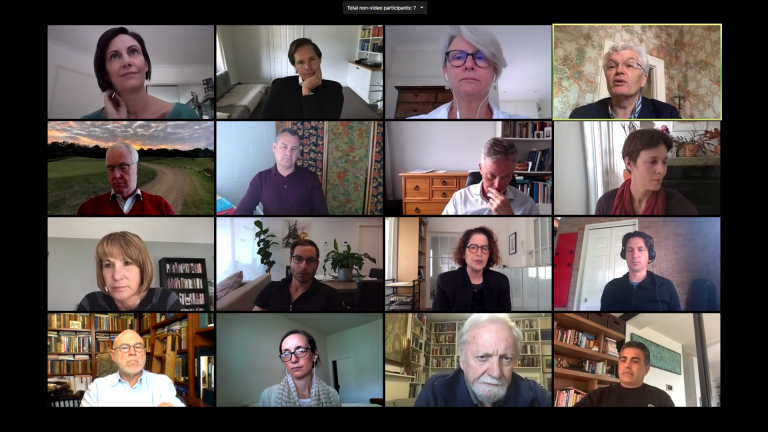Democracy should mean that citizens have the power to make the institutions that control their lives accountable. But this is far from the case. Command and control hierarchies in government departments and the private sector are not responsive to the people whose lives they affect.
Dee Hock, who designed the organizational architecture of the credit card company VISA International once said: hierarchical command and control pyramids of power, whether political, social, educational or commercial, were aberrations of the Industrial Age, antithetical to the human spirit, destructive of the biosphere and structurally contrary to the whole history and methods of physical and biological evolution. They were not only archaic and increasingly irrelevant, they were a public menace.
If citizens are to have any control over the institutions that control their lives, then the pyramids of power need to be turned upside down to create a stakeholder democracy. Stakeholder democracy is dependent upon introducing network governance to allow power to be constructively shared with people affected by the organisation.
Hock described VISA International as “an inside out holding company in that it does not hold, but is held by its functioning parts. The 23,000 financial institutions which create its products are, at one and the same time, its owners, its members, its customers, its subjects and its superiors.” There were five design imperatives for VISA: (i) “It was equitably owned by all participants”; (ii) “Power and function must be distributed to the maximum degree”; (iii) “Governance must be distributive”; (iv) “It must be infinitely malleable yet extremely durable”; (v) “It must embrace diversity and change”.
VISA “has multiple boards of directors within a single legal entity, none of which can be considered superior or inferior, as each has irrevocable authority and autonomy over geographic or functional area. The multiplicity of boards or control centers creates a network system of communications and control similar to that found in the brain, or indeed in all living things. Evolution has proved that network governance provides the most efficient and effective basis to sustain life.
A rich example of network governance is provided by the stakeholder firms located around the town of Mondragón in Spain. The Mondragón Corporacion Cooperativa (MCC) has over 60,000 workers who with their suppliers, customers and community representatives control its operations from the bottom up.
The World Bank found that MCC enterprises were more efficient than conventional firms. Efficiency is obtained not from competition for products or corporate control but through competition for control of the firm between competing stakeholder constituencies.
When the Athenians developed democracy two and half thousand years ago they decentralized power and authority. In addition they placed time limits on the ability of individuals to hold authority. Citizens were required to take responsibility for their own governance as practiced by the MCC. Athenian quorums for holding regular assemblies were 6,000 and individuals who nominated for official positions were appointed by lots to avoid power being obtained by parentage, wealth and/or fame.
In contrast, our two most important channels of power and authority – government departments and corporations – are both controlled from the top down, hollowing out and degrading democracy.
Today corporations are controlled on the basis of one vote per share. This places power with the rich who own the most shares. Their power is held indefinitely and can be passed on to their children to perpetuate power by the rich described as plutocracy.
Even in public corporations, directors, like dictators, typically appoint themselves to create self-perpetuating autocratic power elites. Corporate autocrats control the majority of economic activities in society. Market competition may provide citizens with choice but it is typically a choice between competing dictatorships.
Market forces have failed to develop the more efficient and effective stakeholder organized firm that is dependent upon the introduction of network governance. This is because individuals who create firms have little interest in sharing power. However, most firms require a government license to operate and when firms grow to an influential size their license to operate should include the introduction of network governance to share power with their stakeholders.
There is currently no need to change any law or the duties of company directors to introduce network governance in either the public or private sectors. What is required in the private sector is for shareholders to have a meeting to change their corporate constitution to recognise the obvious, i.e. that no operating business can exist without workers, customers, suppliers and a host community. It is simply good business sense for these people to be bonded to the business by being given a voice. Government departments are no different.
Government departments find it easier to engage with federations of corporate dictatorships then the messy diversified and conflicting interests of the self-employed, small business and unions.
Big business finances political parties and corporate autocrats are rewarded by being appointed as government advisors and to government boards. Inevitably this consolidates a symbiotic sharing of power and influence between government and private autocrats.
The majority of citizens become disenfranchised from the political processes, alienated from government and marginalized from having any control over the institutions that govern them. Protests against globalization demonstrate these feelings.
Market democracies are morphing into federations of autocratic power elites with little accountability or responsiveness to the wishes of citizens. Governments captive to corporate ideology and spin have insidiously or perhaps unwittingly promoted the breakdown of democracy by spreading autocracy through privatization.
A basic argument for privatization is that private ownership makes organizations more efficient than government ownership. However, private ownership increases costs by the need to make a profit. There is no reason that the private benefits captured by private autocrats should be less costly than those of public autocrats and their Ministers. The option of making public or private sector organizations more efficient, effective, responsive and democratic by introducing stakeholder governance is not considered.
Stakeholder governance removes the need for market to regulate firms and reduces the need for regulators to the extent that firms can become self-governing. The ideological argument for privatization is eliminated because efficiency is created by internal political markets instead of relying on problematic external markets for control of the firm. While stakeholders may have different and competing interests they all have an interest in sustaining the organization, be it a firm or public sector department.
Network governance provides the means for increasing operational efficiency, effectiveness, responsiveness and accountability to enrich democracy in either the public or private sectors.
We the people should demand that network governance is introduced into: 1. Government departments and entities; 2. Any organization that is being privatized and 3. All private sector organizations that require a government license to operate such as in banking, insurance, transport, construction, media health and education.



